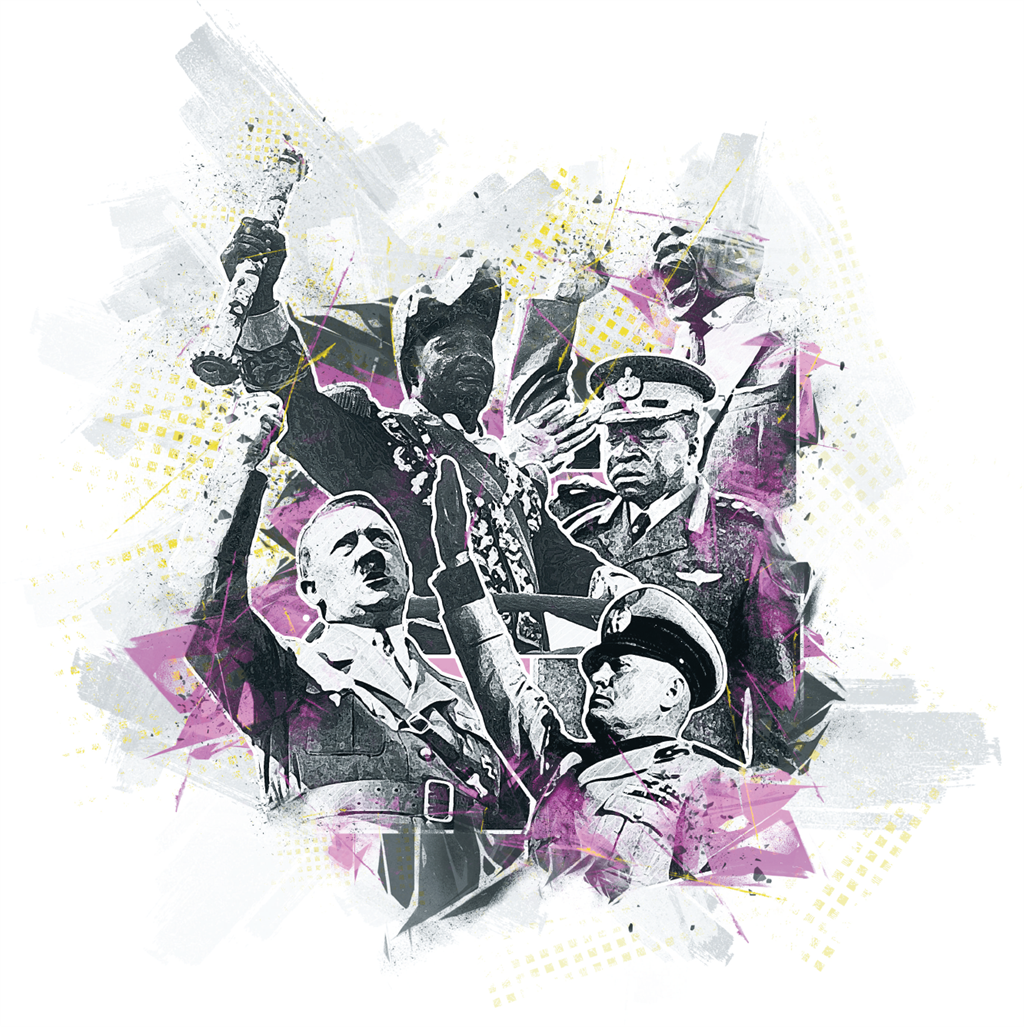
Rise of peacetime people’s leaders is a warning sign that SA is in danger of narcissism
‘A large chair doesn’t make a king,” goes a Sudanese proverb.
Africa may not have a monopoly on despots but it seems to have had more than its fair share.
While the decolonisation of the continent in the middle of the 20th century offered greater freedom for its diverse ethnicities, cultures and languages, it also left a hole in its structure – both socially and politically – creating unique psychological and institutional forces that account for the contrasting natures of the regimes that swept into power.
Whether gaining control via military might or by manipulating the ballot box, once in power it is hard for despotic rulers to let go. Power is addictive.
Living in constant fear of being overthrown, they are often driven to violence by paranoia feeding off the poor judgement that comes from narcissism and hubristic tendencies.
What’s more, they may resort to belligerent behaviour to give the country a sense of purpose and solidarity and to distract attention from their own shortcomings.
The examples are numerous.
Ahmed Sékou Touré of Guinea, who was hailed as a great liberator, remained in power until his death, using death camps to remove any opposition.
Idi Amin’s reign of terror as the “butcher of Uganda” reached legendary proportions, while Jean-Bédel Bokassa, a former colonel who seized power in the impoverished Central African Republic and went on to proclaim himself emperor, allegedly engaged in cannibalism and destroyed the foundations of civil society in a country that has experienced strife ever since.
Whereas we may have believed that we in South Africa has been saved from such history and despots, current trends in the political milieu may prove us wrong.
Take for an example the emergence of pseudo-military lingo and organisations, the rise of narcissistic personalities posing as peacetime people’s leaders, are all warning signs that we are facing a serious problem of narcissism and a return of “big men politics”.
It shouldn’t come as a surprise because history teaches us that it was the great depression that spread fear and uncertainty.
During these times, citizens needed strong leaders to fix their problems and it was these leaders who often became dictators.
These dictators formed totalitarian states. In totalitarian states, political leaders tried to totally control the way people lived and think.
In the 1930s, dictators used print, radio, film and the arts to enforce their views. People who disagreed were punished.
Italy was the first European country to become a totalitarian state. It had a large debt to repay after World War 1.
Many people were out of work and there was political unrest. Benito Mussolini came to power in 1922.
Mussolini promised to restore order, but instead he quickly ended democracy in Italy. He banned all political parties except his Fascist Party. People lost their personal freedoms.
The Great Depression also led to the rise of a totalitarian state in Germany. Germans were angry at how Germany had been punished by the Treaty of Versailles.
Adolf Hitler was a powerful speaker who promised to provide jobs and restore German power in the world.
Hitler led the National Socialist (Nazi) Party. The Nazis said that Germans were a master race and better than other people. They blamed Jews for Germany’s problems.
Note any similarity with our current situation?
In 1933 the German Parliament named Hitler chancellor of Germany and passed a law that gave him total power.
This gave Hitler a legal way to become a dictator. Under Hitler, government set up a secret police force.
Other political parties and labour unions were banned. The Nazis set up prisons called concentration camps.
They sent people who disagreed with Nazi ideas there. Government issued the Nuremberg Laws. It said that Jews were no longer citizens, and took control of Jewish businesses and jobs.
The Nazis also limited women’s rights.
Before I digress into the wilderness of history, let me state that the point is, we should be wary that our current economic crises shouldn’t give rise to tin pots and megalomaniacs.
We have a patriotic duty to protect the hard gains of freedom from the emerging elements posing as peace time generals who have never been to war.
Narcissism has become a sign of our times.
Narcissus, the young man from Greek mythology, fell in love with his own reflection in a pond and ultimately drowned in his attempt to get too close to his own image.
What makes despotic-autocratic leaders particularly dangerous for our democracy and country is not only their tendency towards violence, as the ease with which that tendency can be indulged.
Destructive leadership requires more than a potentially flawed individual with a need for power.
They also need followers who are susceptible to such behaviour. All too easily, Homo sapiens will resort to regressive behaviour patterns.
Not only are narcissistic leaders destroying the morale of citizens, but we now have research telling us that the narcissist’s behaviour rubs off those around them.
Incidents of bullying notably increase in organisations with narcissistic leaders. Can you relate?
Leaders high in dark traits are bad news for this country. Those high in psychopathy and narcissism have a strong desire for power and often lack empathy.
This toxic combination can result in these individuals taking advantage of others, taking credit for their work, being overly critical and generally behaving aggressively.
In other words, leaders high in psychopathy and narcissism are more likely to be bullies.
In contrast to the narcissistic, power-abusing nature of destructive leadership, Africa has had some transformational leaders whose focus extended beyond immediate self-interest – leaders who motivated and inspired followers, providing a compelling vision of the future.
The image of Nelson Mandela striding on to the rugby field at Ellis Park stadium in 1995 wearing a Springbok jersey to present the trophy to the team captain was a powerful symbol of reconciliation, restoring dignity to the black majority while reassuring white South Africans that they need not fear revenge.
This is in stark contrast to the behaviour of Robert Mugabe whose iron fist and vindictiveness towards, not only Zimbabwe’s white population, but the segment of black compatriots who hold opposing views, turned a once rich country into a basket case.
As a way forward, we need to understand how leadership can transform the vision and mission of the country can help governments re-instil pride, cultural understanding and peace between citizens.
Giving future leaders the tools to become more reflective can only help the “new dawn” journey to a peaceful and prosperous future.
Maxon is a social commentator
TALK TO US
Has South Africa been saved from such history and despots or is it edging towards that?
SMS us on 35697 using the keyword DESPOTS and tell us what you think. Please include your name and province. SMSes cost R1.50. By participating, you agree to receive occasional marketing material




 Publications
Publications
 Partners
Partners









